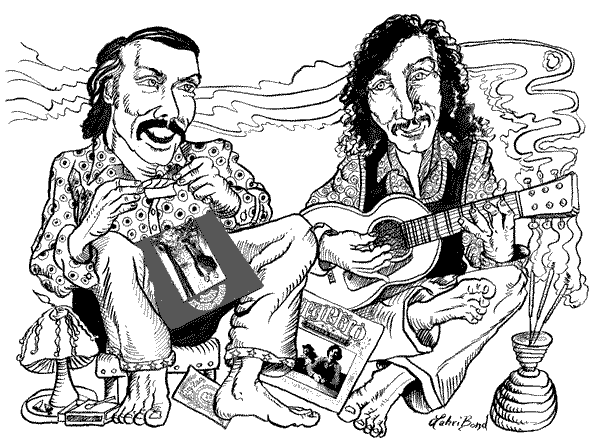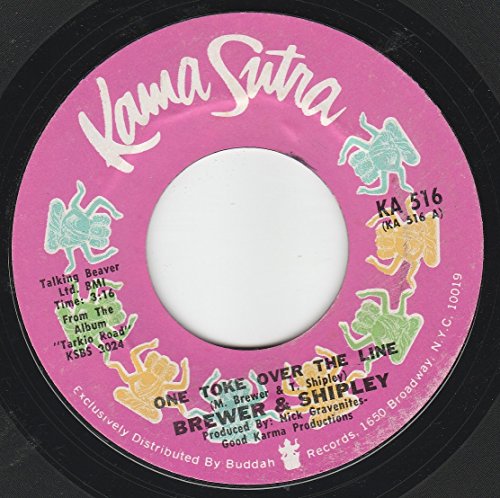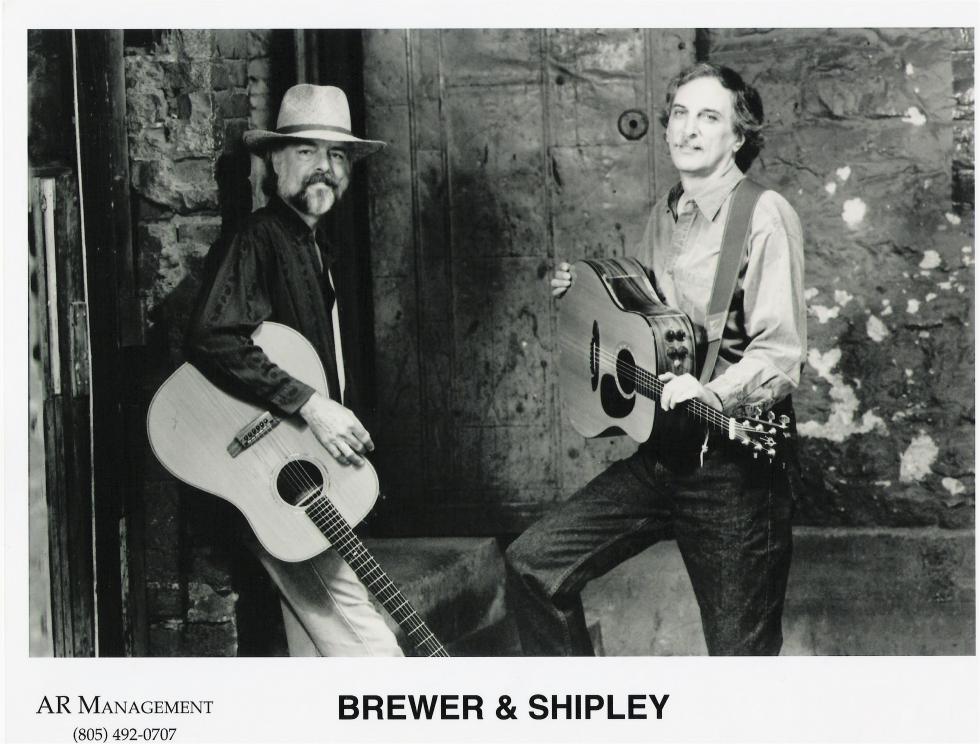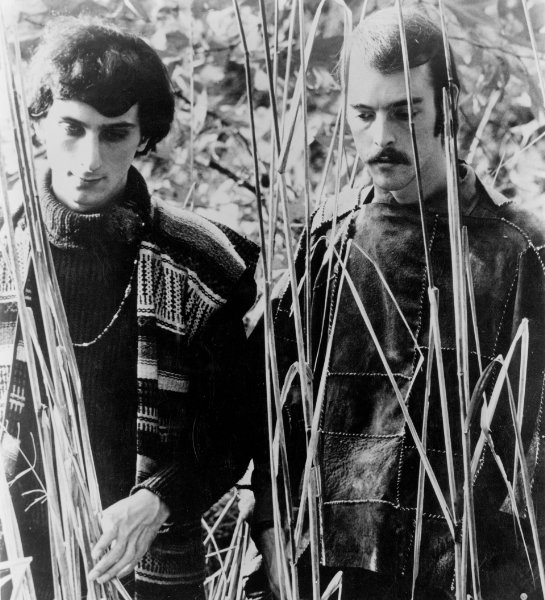High Times of “One Toke Over the Line”

Michael Brewer (L) and Tom Shipley (Dirty Linen cartoon 2005)
Perhaps it would be a reach to call the 1971 folk-rock ballad “One Toke Over the Line” a “one-hit” wonder, but singer-songwriters Brewer & Shipley were mellow about that. During the early 1970s, Michael Brewer and Tom Shipley were based out of Rolla, Mo., a town on a beautiful winding stretch of Route 66 about 100 miles west of St. Louis.
Michael Brewer died on Dec. 17 at his home outside of Branson. Mo. He was 80 years old. He was born in Oklahoma City, OK. No cause of death has been announced.
Brewer & Shipley did have other hits: the J.J. Cale-tinged “Tarkio Road” in June 1970 and “Shake off the Demon,” which cracked Billboard’s top 100 in February 1972. And in 1993 they recorded the underrated “Shanghai” at Lou Whitney’s Column One Studio in Springfield, Mo.—about 100 miles east of Rolla.
The studio band included Morells-Skeletons members Bobby Lloyd Hicks (1947-2017, drums), Joe Terry (keyboards and accordion), D. Clinton Thompson (electric guitars) and Randall Chowning of the Ozark Mountain Daredevils on mandolin among others. “Shanghai” was produced by Brewer, Shipley and Whitney (1943-2014).
“One Toke Over the Line” was produced by Chicago’s Nick Gravenites (1938-2024), the blues bassist who formed Electric Flag with Mike Bloomfield. In a 1996 interview before their gig at a club in suburban Deerfield, IL. Shipley told me the origins of “One Toke Over the Line.”

In the fall of 1970 Brewer & Shipley were performing at a Kansas City, Mo. coffeehouse. Shipley walked backstage and started strumming his guitar. “I looked up and said, ‘Jezzus, Michael, I’m one toke over the line,” Shipley said. “We literally broke into song at that point, sort of simultaneously. We were just kidding.”
After the backstage experiment, Brewer & Shipley played “One Toke” for a couple of friends. But the song didn’t take off until they tossed it as an encore in early 1971 when they appeared with folk singer Melanie at Carnegie Hall.
“I think we were out of songs,” Shipley said. “I can’t remember. The president of our record company (Kama Sutra) was there and said, ‘That’s a single.’ So Michael and I went in the studio and included it on our next album.” That album was “Tarkio,” a town in Missouri whose name comes from the Meskwaki language of “place where the walnuts grow.” These guys were authentic hippies. Shipley continued, ” We went on tour in Florida and when we came back we found out not only did we have a hit record, but we were in a lot of trouble.”

Vice-President Spiro T. Agnew singled out Brewer & Shipley as being “subversive” to America’s youth for “One Toke Over the Line.”
Another smoke signal appeared later in 1971 when Brewer & Shipley played Richard Harding’s iconic Quiet Knight music club in Chicago. The National Association of Broadcasters convention was in town. Because of that, the Federal Communications Commission was also in Chicago.
“It was one of the last times we played Chicago,” Shipley said in 1996. “Stations were beginning to drop the song because of what Vice-President Agnew said. So everybody comes down to see us. The place is packed: heavy-duty radio guys and some of the FCC, including the head of the FCC (Nicholas Johnson.) So I dedicated ‘One Toke ‘ to him. Afterward he came backstage with these broadcasters and he’s wantin’ to be our buddy, claiming his comments were taken out of context.”
Yet, “One Toke Over the Line” was featured on the Lawrence Welk television show because of the reference to “sweet Jesus.” I rarely post videos, but I have to share this because I can’t think of any song covered by Welk and the Grateful Dead. Wait for the end for Welk’s spiritual endorsement:
“One Toke Over the Line” made it onto the soundtrack of the 1998 Johnny Depp film “Fear and Loathing in Las Vegas” and Shipley said that he and Brewer discussed a reggae follow-up. “Except we would put it in the past tense,” he said. ‘I must have been one toke over the line/I think I was one toke over the line.’ We like doing reggae, but you have to understand we’re a couple of white guys living south of Interstate 44 in the middle of the Ozarks.”
Shipley later became a television producer-director in Rolla and founded the Oral History of the Ozarks Project, a non-profit organization that produced documentaries about the Missouri Ozarks. Brewer relocated to the Branson area from Tulsa, Ok. because of the engineering scene for concerts and recording. Here is a comprehensive Brewer & Shipley website.
At one time we wanted to include Brewer & Shipley in our “Center of Nowhere” documentary about music and life in the Ozarks, but we ran out of money and time.
As was so often the case with bands across America, Whitney and his Springfield “Wrecking Crew” became the musical texture behind “Shanghai.” In the early 1970s Thompson, Whitney and Lou’s wife at the time Maralie (1930-2013) were playing in a band called Woogie that was in regular rotation in Columbia, Mo.
They landed a gig at a Rolla club called the Pub Mobile. The subterranean bar was part of an automobile museum on a plot of land owned by a guy who dated Donna Douglas–”Elly Mae Clampett’ on the Beverly Hillbillies. Tangential history like that is why I adore the Ozarks.

Brewer & Shipley in the “weeds.”
“We played in the basement of this antique car place on Route 66,” Thompson once told me. “The booths looked like old cars. Tom (Shipley) came to the Pub Mobile. He lived on the Gasconade (river) and played in Rolla. I was pretty wary of playing six nights a week in this lounge. We had to learn some top 40 stuff doing this gig. We always felt we brought disco to Rolla, Missouri.”
Brewer and Shipley performed with bass and guitar around Rolla. “And they were called Maralie and the Guise,” Shipley said in our 1996 conversation. “When Michael and I decided to put together a band, we got those guys.”



Crete, Nebraska’s claim to fame is in “Tarkio Road!”
Thank you, Dave!